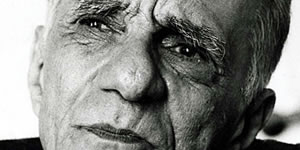
 One of the most important Brazilian poets of the postwar generations,Cabral continues to exert a strong influence on many younger Brazilian poets. As Régis Bonvincino writes to me about Cabral: “Along with Carlos Drummond de Andrade and Murilo Mendes, Cabral is considered the best poet of Brazilian Poetry born in the 20’s.”
One of the most important Brazilian poets of the postwar generations,Cabral continues to exert a strong influence on many younger Brazilian poets. As Régis Bonvincino writes to me about Cabral: “Along with Carlos Drummond de Andrade and Murilo Mendes, Cabral is considered the best poet of Brazilian Poetry born in the 20’s.”
Cabral’s Selected Poetry: 1937-1990 is published by Wesleyan, and included the well-known translation of his work by Elizabeth Bishop. On learning of his death, Horacio Costa and I translated two poems of Cabral, with Régis adding some changes by email to the first. I published the first in Recalculating. I also include here a translation by Paula Speck.
Charles Bernstein (1999)
Psychology of Composition (VII)
It’s mineral the paper
on which to write
verse; verse
that is possible not to make.
Mineral are
flowers and plants,
fruits, animals
when in a state of words.
Mineral
the horizon line,
our names, those things
made of words.
Mineral, at last,
any book:
‘cause the written
word is mineral, the cold nature
of the written word.
(Translated by Charles Bernstein, Horacio Costa and Régis Bonvincino, based
on the published translations of Djelal Kadir.)
from Psicologia de composição VII
É mineral o papel
one escrever
o verso; o verso
que é possível não fazer.
São minerais
as flores e as plantas,
as frutas, os bichos
quando em estado de palavra.
É mineral
a linha do horizonte,
nossos nomes, essas coisas
feitas de palavras.
É mineral, por fim,
qualqur livro:
que é mineral a plaavra
escrita, a fria natureza
de palavra escita.
•••
The Last Poem
I don’t know who sends me poetry
nor whether Who would call it that.
But who who may be, who
that Who (myself, my sweat?),
be it woman, landscape, or the no
that needs fill the void,
to make, for example, the crutch
that I made walk the left soul,
to Whom should be given the inglorious burden
I ask: my last poem
sent, as a poem perverse,
antilyric, made into antiverse.
(Translated by Charles Bernstein and Horacio Costa, based on the published translations
of Djelal Kadir.)
TWO PARTIES FOR DEATH
Death holds formal inaugurations:
the dead man, dressed for his unveiling;
ambiguously: with the speaker’s suit
and the robes of the statue.
In the coffin, a coffin half pedestal,
the dead man is not so much dead as dedicated–
and twice; once as a statue of himself
and once as himself, the final version.
* * *
And death gives picnics for children:
a child’s burial in the Northeast:*
reserved for children thirteen and under;
no adults allowed.
Half party, half picnic:
in the open air; a great excuse for a school break,
for the children to play with a doll:
even better, a doll that’s really real.
* The Northeast is the driest, poorest part of Brazil. Cabral was from
there.
(Translated by Paula Speck)
DUAS DAS FESTAS DA MORTE
Recepções de cerimônia que dá a morte:
o morto, vestido para um ato inaugural;
e ambiguamente: com a roupa do orador
e a da estátua que se vai inaugurar.
No caixão, meio caixão meio pedestal,
o morto mais se inaugura do que morre;
e duplamente; ora sua própia estátua
ora seu própio vivo, em dia de posse.
*
Piqueniques infantis que dá a morte:
os enterros de criança do Nordeste:
reservados a menores de treze anos,
imprópios a adultos (nem o seguem).
Festa meio excursão meio pequenique,
ao ar livre, boa para dia sem classe;
nela, as crianças brincam de boneca,
e aliás, com uma boneca de verdade.
••
see also additional poems at New American Writing